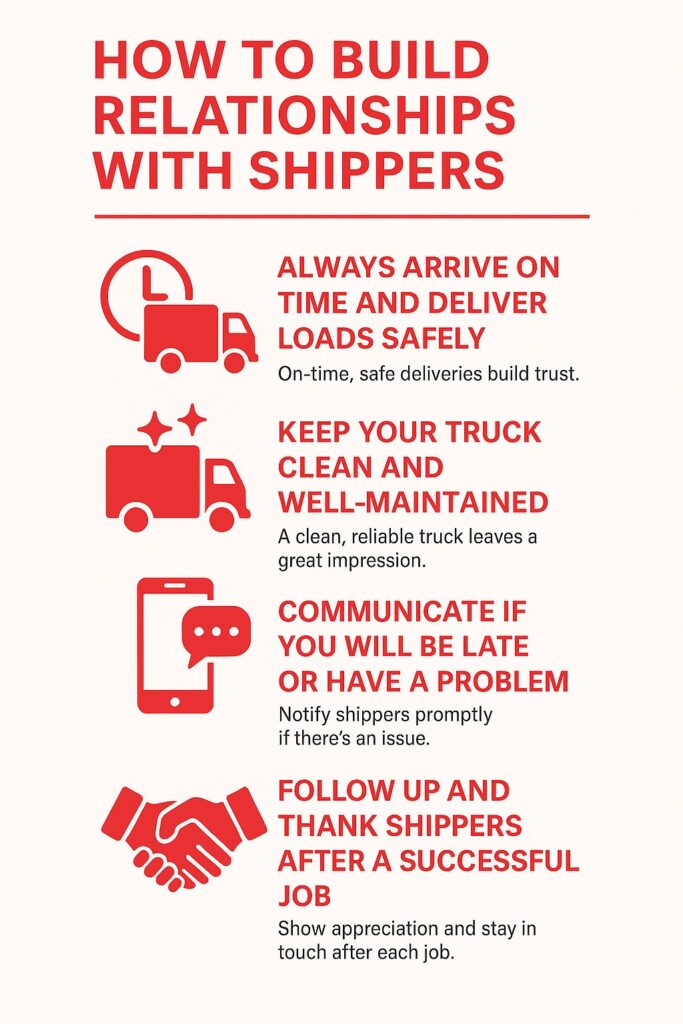Owner operators play a huge role in the trucking industry. But one big challenge stands out for anyone new to the business: how do owner operators find loads? To make good money, keep your truck busy. You also need to meet your business goals.
Learning how to find truckloads effectively is important for an owner-operator. This guide will break down the top methods, explain how each works, and offer tips to help you succeed.
1. Use Load Boards
Load boards are the most popular tool for owner-operators to find loads. These online platforms connect truckers with companies that have freight to move.
You can search for loads that fit your truck, location, and schedule. Some of the biggest load boards include DAT, Truckstop.com, and 123Loadboard.
How Load Boards Work
After you sign up, you can view thousands of loads posted by shippers, brokers, and other carriers. You can filter your search by route, trailer type, price, and delivery date. Many load boards update every few minutes. Some even let you negotiate rates with the shipper directly in the app or website.
Pros and Cons
- Pros: You have many choices and can work with different brokers and shippers. Many owner operators start here, especially if they are new to the industry.
- Cons: You will face a lot of competition. Some loads pay less because many drivers are looking at the duplicate postings. You may have to hustle for the best loads.
Tips for Success
Always keep your driver’s license, insurance, and truck documents current. Some shippers check these before they assign loads. Build a strong profile on each load board and check broker reviews before you accept any job.
2. Work with a Dispatching Service
If you do not have time to search load boards, a dispatching service can help. Dispatchers work as your partners, finding loads for owner operators so you can focus on driving and delivery.
How Dispatching Services Work
You sign a contract with a dispatching service. The dispatcher searches for loads, negotiates rates, handles paperwork, and sometimes manages billing. You tell the dispatcher your business goals, such as preferred routes, type of loads, and how often you want to drive.
Pros and Cons
- Pros: Saves you time and effort. Dispatchers know the market and often find better rates. They help you avoid empty miles.
- Cons: You pay a fee, usually a percentage of your earnings. Some services take as much as 10 percent, so check contracts closely.
Tips for Success
Choose a dispatching service with a good reputation and clear reviews. Tell them exactly what kind of loads you want. This will keep your business running smoothly and help you consistently work toward your goals.
3. Find Loads through Freight Brokers
Many owner operators choose to work with a freight broker. A broker acts as the middleman between the shipper and the truck driver. Freight brokers have extensive networks of shippers who must move goods across the country.
How Freight Brokers Work
You can contact a broker directly, or they may reach out to you if you have posted your truck as available on a load board. Brokers find loads, set up the shipment, and handle much of the paperwork. They charge a fee, but they often provide access to better-paying loads.
Pros and Cons
- Pros: Freight brokers can help you build relationships with shippers. They often get first pick of new loads. Some brokers have regular customers, so you can find steady work.
- Cons: You have less control over the exact rate because the broker takes a cut. Make sure to understand the broker’s fee before agreeing to a load.
Tips for Success
Always check the broker’s reputation. Look for those who pay on time and have a track record of honest business. Over time, you can build a partnership that leads to even more opportunities.
4. Cold Calling and Direct Outreach
Not every owner-operator uses the Internet to find truck loads. Some drivers have great success with cold calling and direct outreach to shippers. This method takes more time and effort, but it can pay off with steady, high-paying freight.
How Cold Calling Works
List companies that ship goods in your area or along your favorite routes. Call the shipping manager and introduce yourself as an owner operator looking for loads. Explain your equipment, what type of freight you move, and your availability. Some shippers like working with owner operators because it saves them money compared to hiring a trucking company.
Pros and Cons
- Pros: You can get direct loads without a broker or load board fee. If you build relationships with shippers, you can fill your calendar with repeat business.
- Cons: Cold calling takes patience and strong communication skills. Many shippers already work with carriers, so you may often hear “no” before you get a “yes.”
Tips for Success
Stay organized. Keep a list of contacts and follow up after every call. Use a simple script, but be friendly and professional. Even if a shipper does not have loads, they may call you later if needed.
5. Leasing On with a Trucking Company
Many owner operators choose to lease on with a company rather than work independently. Leasing means you sign a contract with a trucking company that supplies steady loads. You use your truck but operate under the company’s authority.
How Leasing On Works
The trucking company finds loads, handles permits and insurance, and pays you a percentage of each load. You focus on driving and meeting delivery times. Some companies also offer fuel cards, maintenance discounts, and extra benefits.
Pros and Cons
- Pros: Steady work, less paperwork, and support from an established business. Great for new owner operators who want help finding loads.
- Cons: The company takes a cut of your earnings. You may have less freedom to pick your loads or routes.
Tips for Success
Read the contract carefully. Ensure you understand your pay rate, what costs you cover, and what the company handles. Ask other drivers about their experiences with the company.
IMPORTANT: Building Relationships with Shippers
Whatever method you use, building long-term relationships with shippers should be a top goal. Shippers want reliable, on-time drivers who communicate well. Good relationships mean shippers may call you first when they have new freight. This lets you avoid empty miles and keeps your business steady.
Tips to Build Relationships
- Always arrive on time and deliver loads safely.
- Keep your truck clean and well-maintained.
- Communicate if you will be late or have a problem.
- Follow up with shippers after a successful job and thank them.
The more shippers trust you, the more likely you will get repeat work.

Choosing the Right Mix for Your Business
No one method fits every owner operator. Some drivers use several options to find truckloads for owner-operators. For example, you might use load boards when you have gaps in your schedule, but rely on a dispatching service for your primary business. Others build direct shipper relationships to work consistently and only use brokers as a backup.
Think about your business goals and what works best for your schedule. Some methods take more time and effort, but lead to higher pay and freedom. Others are easier but may have lower rates.
Final Tips for Owner Operator Finding Loads
- Keep your driver’s license, truck, and insurance in good standing.
- Stay organized with all paperwork, especially with multiple brokers or companies.
- Network with other owner operators and company drivers at truck stops or industry events.
- Always ask about payment terms before you accept a load.
- Never take a load that does not fit your equipment or business goals.
The best owner operators stay flexible, keep learning, and adjust as the trucking industry changes.
Conclusion
Finding loads as an owner operator takes skill, strategy, and hard work. Whether you use load boards, dispatching services, freight brokers, cold calling, or lease with a trucking company, each method has pros and cons.
Combine these strategies to suit your business. Always focus on building relationships that help you reach your goals. The more you learn and adapt, the more successful your trucking business will be.







